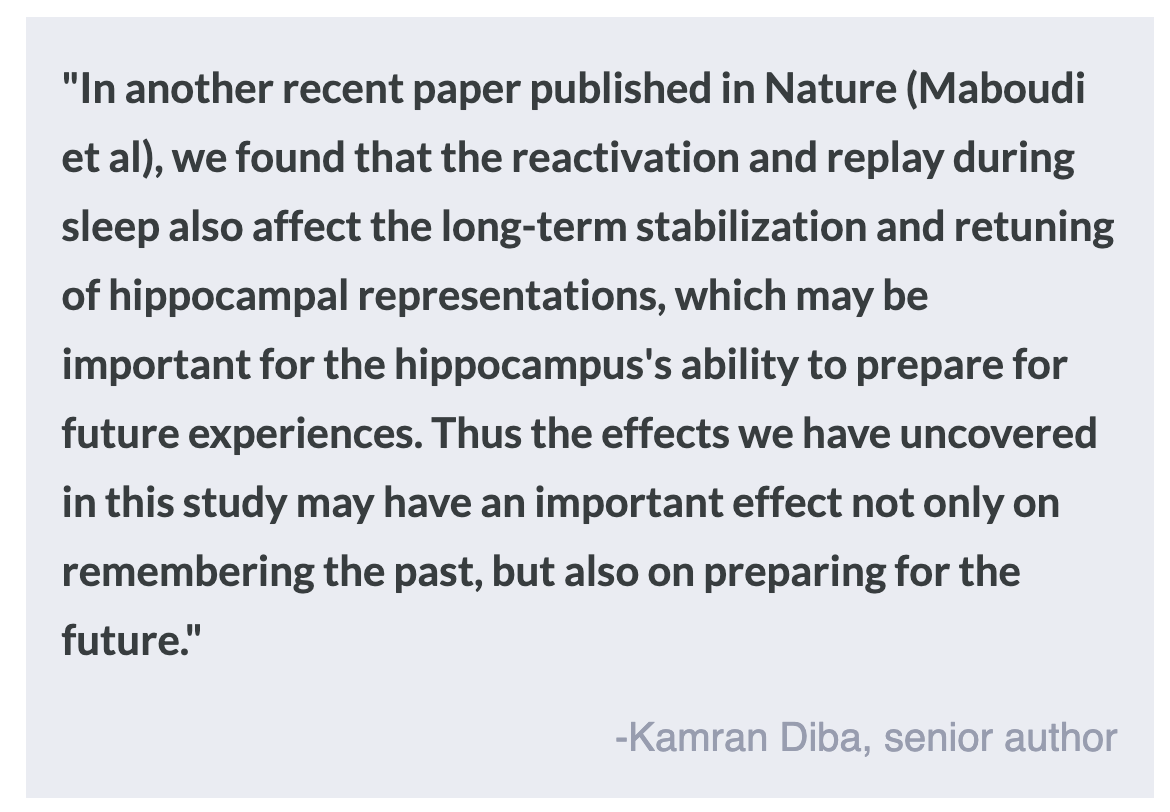Sleep Loss Has Long-Lasting Consequences On Memory Processes in the Hippocampus
Post by Trisha Vaidyanathan
The takeaway
It is well-known that sleep loss hurts our memory, but it is not known how sleep loss affects memory processes in the brain. This study found that sleep loss prevents the hippocampus from “reactivating and replaying” memories, impairing the process of memory consolidation.
What's the science?
Many studies have demonstrated that the hippocampus is critical for promoting memory during sleep. When a rat runs through a maze, a specific subset of hippocampal neurons is activated and will then “reactivate” during sleep. Further, the order in which neurons activate in the maze will “replay” in the same order during sleep. This “reactivation” and “replay” process allows the brain to transfer the memory to other brain regions for long-term storage, a process called memory consolidation. Just as sleep promotes memory, it’s known that sleep loss can impair memory. However, it’s not known how sleep loss impacts hippocampal memory processes. This week in Nature, Giri and colleagues demonstrated that sleep loss diminishes the ability of the hippocampus to reactivate and replay memories and that these processes are not fully restored, even after recovery from sleep loss.
How did they do it?
To study memory processes in the hippocampus, the authors used extracellular electrophysiology to record continuous activity from over 800 neurons in the hippocampus of rats. There were three phases of the experiment: First, the rats were able to sleep or rest naturally. Second, the rats explored a new maze for one hour. Third, the rats were either allowed to sleep naturally for 9 hours, or they were sleep deprived for 5 hours, followed by 4 hours of “recovery sleep”.
The authors first investigated how sleep loss impacted sharp-wave ripples, a type of neuronal oscillation known to drive reactivation and replay, and neuronal firing rates. Next, the authors used the neuronal activity recorded during the maze to study how sleep loss impacted hippocampal reactivations and replay. Reactivation was measured by assessing how links between neurons (using pairwise correlation) observed during the maze were similar to the links between neurons observed during subsequent sleep or sleep deprivation. Replay was measured by examining what proportion of the sharp-wave ripples observed after the maze contained neuronal firing patterns that could be used to accurately decode where the rat moved when it was in the maze.
What did they find?
First, the authors analyzed the neuronal recordings for sharp-wave ripples and found that while the rate of ripples decreased over natural sleep, the rate remained elevated during sleep deprivation. However, the sharp-wave ripples had a higher frequency and smaller amplitude than those in natural sleep. Neuronal firing rate also decreased during natural sleep and remained elevated during sleep deprivation. However, when the rats were allowed recovery sleep after sleep deprivation, the ripples and neuronal firing rate recovered to normal levels.
Next, the authors examined reactivation events. After exploring the maze, rats that were allowed natural sleep exhibited hours of reactivation, while rats that were sleep-deprived had virtually no reactivation. Surprisingly, unlike the sharp-wave ripple rate, reactivations did not return to normal levels during the recovery sleep that followed sleep deprivation.
Lastly, the authors tested the effect of sleep loss on replay events. As expected from the literature, a high proportion of sharp-wave ripples contained replay events in rats that were allowed to sleep naturally. Rats that were sleep-deprived, however, had significantly fewer replay events. Strikingly, the replay events continued to decrease even during the recovery sleep period.
Together, the results from this study demonstrated that even though sharp-wave ripples appear to return to normal after recovery from sleep loss, the critical memory processes of reactivation and replay did not, suggesting long-term consequences of sleep loss on memory.
What's the impact?
Sleep loss is highly prevalent in our society and sleep disorders like insomnia are co-morbid with many other diseases. Many functions of sleep are known to return to normal levels following sufficient recovery sleep, but this study demonstrates why the effect of sleep loss on memory may be long-lasting.


